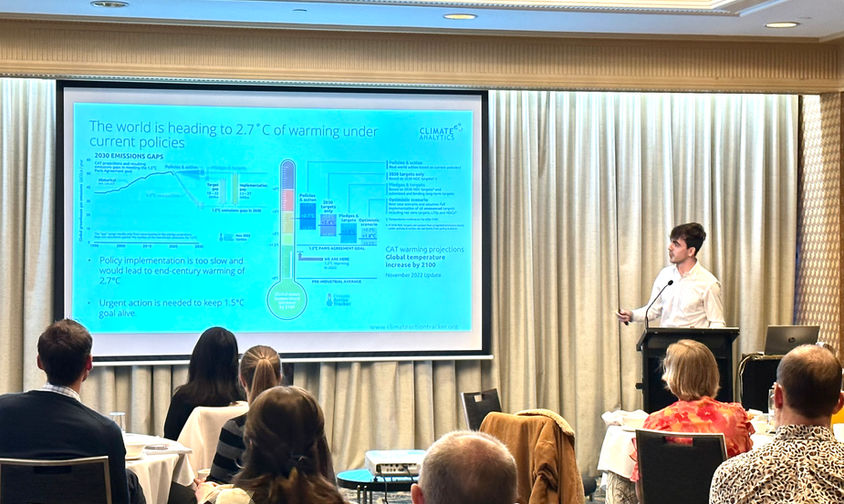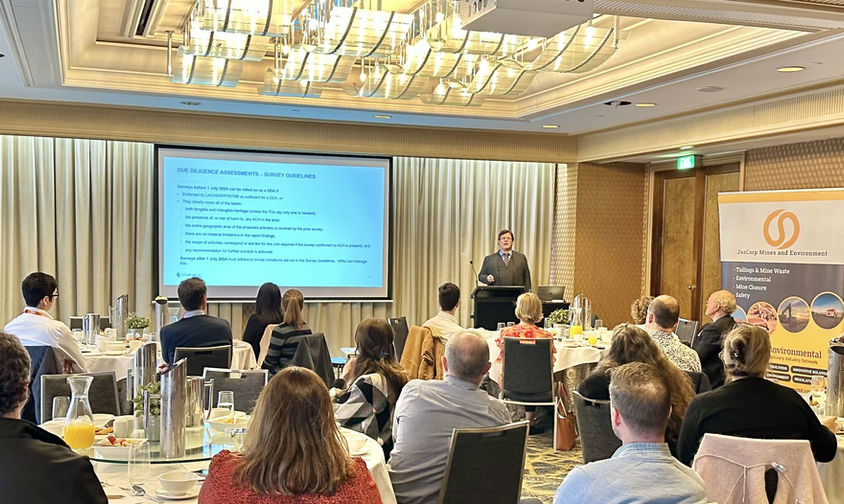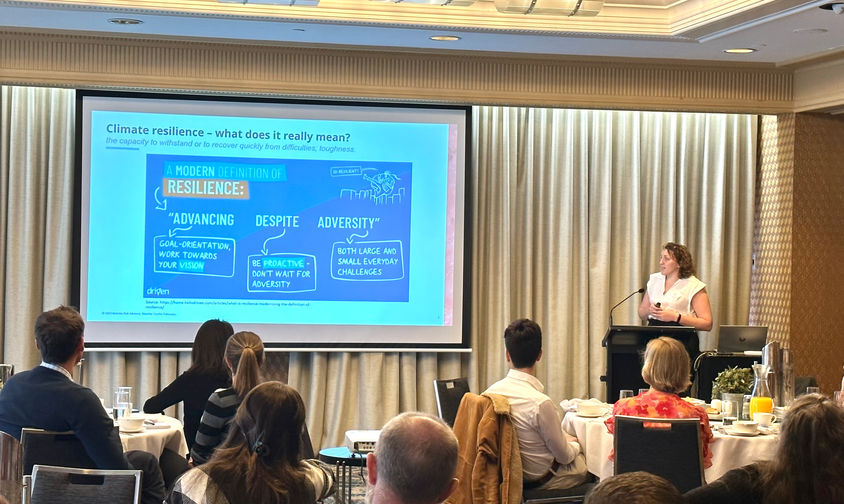
Symposium
Environmental and market forces are putting pressure on the mining industry to accelerate climate efforts. Now is the time to invest in climate capability for a resilient mining sector.
Hear directly from regulators, legal , educational and practical experts on how you and your organisation can remain abreast of changes, and how you can position yourself to respond.
For Sponsorship enquiries please email environment@jazcorpaustralia.com.au
Mining Sector & Climate Change
&
Safeguard Mechanism Reforms;
Legal, Risks, Reporting and Resilience Building
Implications of the latest policy developments for the future of the industry.
21st July 2023
Thank you to all who attended this event.
The event was well received an attended by Environmental and Planning Professionals
We extend our gratitude to all presenters who contributed to the success of this event.
Missed the event?
Subscribe to this expanding network and remain updated, connected and informed.
Join us for upcoming events which are being added to the calendar.

Topics

Felicity Huxtable
Dept of Mines,Industry Regulation and Safety
Team Leader Compliance and Enforcement

Chris Marchesi
Special Counsel
Gilbert + Tobin

Marshall McKenna
Partner
Gilbert + Tobin

DMIRS Policy – “Approach to Risk based Environmental Compliance for the Resource Industry” provides transparency as to how the department’s Resource and Environmental Compliance (REC) Division applies a risk-based compliance approach across the lifecycle of a resources operation.
The Policy considers the overarching purpose of compliance activities, risk based planning, types of compliance activities, and establishing priorities.
Mining Sector and Climate Change : Legal, Risks, Reporting and Resilience Building
2022 and the start of 2023 will be remembered for the momentous developments in climate and energy law and policy at both the Commonwealth and State level in Australia. Since the change in Federal Government in 2022, Australia has also re-engaged on the international stage on issues such as climate change and biodiversity, as well as introducing a raft of new legislation and policies.
State Governments are following suit and are implementing a range of changes aimed at transforming their energy, economic and climate trajectories. It is clear that immediate, effective and meaningful action is occurring across governments, industry and society, but that much also remains to be done.
This seminar will cover the key recent climate related regulatory and policy reforms that have been announced and how they are driving project development and investment.
Impacts of Environmental Protection and Community Relations on Mining Projects
-
Western Australia’s Aboriginal Cultural Heritage Act 2021 (expected to commence July 2023) – Impacts and what to expect.
-
Native Title rights and interests, Aboriginal cultural heritage – Understand why mining is subject to cultural heritage and environmental approvals that can impose significant operational and rehabilitation liabilities throughout the life of the project and upon mine closure.
Building climate capability for a resilient mining sector – enabling environment professionals to mitigate climate business risk
• How will climate impact on the environment – risks and opportunities
• Planning for different scenarios – compliance, standards and societal expectations
• Enabling your people – the role of the environment professional
Celia Hayes
Deloitte
Sustainability & Climate Change
Risk Advisory

Prof. Alex Gardner
University of WA Centre for Mining, Energy and Natural Resources Law
Safeguard Mechanism Reforms and Regulation of Greenhouse Gas Emissions in Western Australia.
Alex Gardner, Professor of Law, University of Western Australia
and Dylan Williams, JD Student, University of Western Australia.
“The enactment of the Commonwealth’s Safeguard Mechanism reforms in April-May 2023 is the most significant legislative reform in the Australian regulation of greenhouse gas emissions (GHGe) since 2011.
The large GHG emitters regulated as designated facilities under the Safeguard Mechanism account for about 28% of Australia’s annual GHGe, and it is essential that there be a means of reducing those emissions in order to achieve the national GHGe reduction commitments under the Paris Agreement, which have been enacted in the Climate Change Act 2022 (Cth).
What makes the Safeguard Mechanism reforms significant is that the legislation sets legal limits on combined GHGe of these facilities, and legal duties for the facilities to reduce their emissions each year.
The primary purpose of this presentation is to give an overview of the effect of these new limits and duties. A second purpose is to evaluate the interaction of the Safeguard Mechanism reforms with the regulation of GHGe through environmental impact assessment under the Environmental Protection Act 1986 (WA). This process has been used to regulate major projects’ GHGe for more than 20 years.
The Commonwealth’s legislation declares that it does not exclude the operation of State law, and the Environmental Protection Authority of WA has issued guidelines declaring its intention to avoid regulatory duplication.
How will these two schemes of regulation interact from July 2023?”

Thomas Houlie
Climate and energy policy analyst at Climate Analytics
The mining industry in the climate transition
This presentation will explore the latest scientific research on climate change and the contribution of the mining industry towards the transition. Our focus will be on the Australian context, where the mining industry has a significant impact on the energy sector.
We will explore the challenges and opportunities that arise from this interplay and discuss the implications of the latest policy developments for the future of the industry.

Speaker BIO's

Chris is a special counsel in Gilbert + Tobin's Energy + Resources group in Perth, specialising in mining, oil & gas, renewables and infrastructure projects and M&A.
Chris advises Australian and international energy and resources companies, project owners and investors across a wide range of project development matters and transactions in the energy and resources industry.
Chris’ work spans project development, land access, environment, clean energy, State Agreements, offtake and energy supply (including LNG and gas), acquisitions, disposals, financings, joint ventures, approvals and regulatory matters.
Chris has a Bachelor of Laws and a Bachelor of Commerce (Finance) from the University of Notre Dame Australia.
Chris Marchesi
Special Counsel
Gilbert + Tobin

Prof. Alex Gardner
The University of WA Centre for Mining, Energy and Natural Resources Law
Since 1988, Alex has been based at the University of Western Australia Law School teaching undergraduate and postgraduate students in Public Law and Natural Resources and Environmental Law. He was appointed Professor of Law in July 2015.
Besides his academic teaching and research interests, Alex has, since 1994, been an environmental legal consultant, especially to the Environmental Defender's Office (WA) and to Western Australian Government Agencies responsible for water resources management. He was a member of the Advisory Council to the Environmental Protection Authority of Western Australia from June 1995 to August 1999 and was a senior sessional member of the State Administrative Tribunal from 2005-2017.
From October 2006 to June 2008, Alex advised the State Department of Water on water resources law reform. In 2009-10 he assisted with advice to the Commonwealth Government on issues relating to the Murray Darling Basin. In 2013-15, he assisted the National Water Commission and the Commonwealth Department of Environment.
Alex is a contributing editor to the Environmental and Planning Law Journal and was from 2012-2017 the editor of the Australian Resources and Energy Law Journal.

Felicity is an experienced environmental professional with extensive environmental management and compliance experience within the site based, corporate and regulatory sectors. She is passionate about working collaboratively with all stakeholders and leading high performing teams to deliver improved environmental outcomes.
Felicity has successfully established and led a dedicated Compliance and Enforcement Team to improve and deliver the risk based environmental compliance program for over 800 mine sites across Western Australia.
Skills: Mine Closure · Environmental Science · Risk Assessment · Regulatory Compliance · Team Building · Environmental Auditing
Felicity Huxtable
Dept of Mines, Industry Regulation and Safety
Team Leader Compliance and Enforcement | Resource and Environmental Compliance Division

Celia leads Deloitte’s sustainability & climate change team in Perth.
A geologist by training, she has over 9 years’ experience in the global resources sector, covering offshore wind, oil and gas, natural resource management and mining – from Colombia to the Northern Territory.
Celia’s more recent experience in the sector was in the global environment team for South32, and this supports the perspective she will bring to today’s talk
Celia Hayes
Deloitte
Sustainability & Climate Change
Risk Advisory
Perth

Marshal McKenna
Partner
Gilbert + Tobin

Thomas Houlie
Climate and Energy Policy Analyst
Climate Analytics
Marshall is one of Australia’s most experienced native title and Aboriginal heritage practitioners and has acted on native title and Aboriginal land matters (both litigious and commercial) in all Australian jurisdictions other than Tasmania.
Marshall is ranked Band 1 by Chambers Asia-Pacific 2023 and as a Leading Individual by Legal500 Asia-Pacific 2022 for Native Title. He is also recognised by Best Lawyers Australia (2012 – 2022) as a leading lawyer in the areas of Construction/Infrastructure Law, Land Use and Zoning Law, Litigation, Mining Law, Native Title Law and Natural Resources Law.
Marshall was also named as ‘Lawyer of the Year (Perth)’ for Native Title Law by Best Lawyers Australia in 2017 and 2020.
Thomas Houlie is climate and energy policy analyst at Climate Analytics, contributing to projects focusing on Australia and the Asia-Pacific region. He is currently assessing Australian climate policies. Prior to joining Climate Analytics,
Thomas has worked at the Embassy of France in Seoul as Deputy Energy Advisor, in charge of renewables and new technologies.
He has been involved in the G7 and BRICS Research Groups, where he coordinated research on energy policy as analyst then as compliance director.
Thomas holds a Masters of Environmental Engineering from the University of Melbourne and a Masters of Civil Engineering from ESTP Paris.














